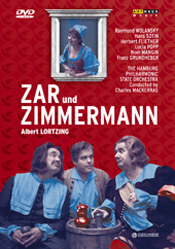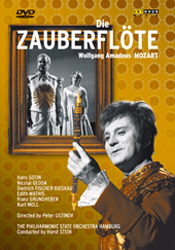Recently in Recordings
The Sixteen continues its exploration of Henry Purcell’s Welcome Songs for Charles II. As with Robert King’s pioneering Purcell series begun over thirty years ago for Hyperion, Harry Christophers is recording two Welcome Songs per disc.
In February this year, Albanian soprano Ermonela Jaho made a highly lauded debut recital at Wigmore Hall - a concert which both celebrated Opera Rara’s 50th anniversary and honoured the career of the Italian soprano Rosina Storchio (1872-1945), the star of verismo who created the title roles in Leoncavallo’s La bohème and Zazà, Mascagni’s Lodoletta and Puccini’s Madama Butterfly.
Collapsology. Or, perhaps we should use the French word ‘Collapsologie’ because this is a transdisciplinary idea pretty much advocated by a series of French theorists - and apparently, mostly French theorists. It in essence focuses on the imminent collapse of modern society and all its layers - a series of escalating crises on a global scale: environmental, economic, geopolitical, governmental; the list is extensive.
Amongst an avalanche of new Mahler recordings appearing at the moment (Das Lied von der Erde seems to be the most favoured, with three) this 1991 Mahler Second from the 2nd Kassel MahlerFest is one of the more interesting releases.
If there is one myth, it seems believed by some people today, that probably needs shattering it is that post-war recordings or performances of Wagner operas were always of exceptional quality. This 1949 Hamburg Tristan und Isolde is one of those recordings - though quite who is to blame for its many problems takes quite some unearthing.
The voices of six women composers are celebrated by baritone Jeremy Huw Williams and soprano Yunah Lee on this characteristically ambitious and valuable release by Lontano Records Ltd (Lorelt).
As Paul Spicer, conductor of the Royal Birmingham Conservatoire Chamber Choir, observes, the worship of the Blessed Virgin Mary is as ‘old as Christianity itself’, and programmes devoted to settings of texts which venerate the Virgin Mary are commonplace.
Ethel Smyth’s last large-scale work, written in 1930 by the then 72-year-old composer who was increasingly afflicted and depressed by her worsening deafness, was The Prison – a ‘symphony’ for soprano and bass-baritone soloists, chorus and orchestra.
‘Hamilton Harty is Irish to the core, but he is not a musical nationalist.’
‘After silence, that which comes closest to expressing the inexpressible is music.’ Aldous Huxley’s words have inspired VOCES8’s new disc, After Silence, a ‘double album in four chapters’ which marks the ensemble’s 15th anniversary.
A song-cycle is a narrative, a journey, not necessarily literal or linear, but one which carries performer and listener through time and across an emotional terrain. Through complement and contrast, poetry and music crystallise diverse sentiments and somehow cohere variability into an aesthetic unity.
One of the nicest things about being lucky enough to enjoy opera, music and theatre, week in week out, in London’s fringe theatres, music conservatoires, and international concert halls and opera houses, is the opportunity to encounter striking performances by young talented musicians and then watch with pleasure as they fulfil those sparks of promise.
“It’s forbidden, and where’s the art in that?”
Dublin-born John F. Larchet (1884-1967) might well be described as the father of post-Independence Irish music, given the immense influenced that he had upon Irish musical life during the first half of the 20th century - as a composer, musician, administrator and teacher.
The English Civil War is raging. The daughter of a Puritan aristocrat has fallen in love with the son of a Royalist supporter of the House of Stuart. Will love triumph over political expediency and religious dogma?
Beethoven Symphony no 9 (the Choral Symphony) in D minor, Op. 125, and the Choral Fantasy in C minor, Op. 80 with soloist Kristian Bezuidenhout, Pablo Heras-Casado conducting the Freiburger Barockorchester, new from Harmonia Mundi.
A Louise Brooks look-a-like, in bobbed black wig and floor-sweeping leather trench-coat, cheeks purple-rouged and eyes shadowed in black, Barbara Hannigan issues taut gestures which elicit fire-cracker punch from the Mahler Chamber Orchestra.
‘Signor Piatti in a fantasia on themes from Beatrice di Tenda had also his triumph. Difficulties, declared to be insuperable, were vanquished by him with consummate skill and precision. He certainly is amazing, his tone magnificent, and his style excellent. His resources appear to be inexhaustible; and altogether for variety, it is the greatest specimen of violoncello playing that has been heard in this country.’
Baritone Roderick Williams seems to have been a pretty constant ‘companion’, on my laptop screen and through my stereo speakers, during the past few ‘lock-down’ months.
Melodramas can be a difficult genre for composers. Before Richard Strauss’s Enoch Arden the concept of the melodrama was its compact size – Weber’s Wolf’s Glen scene in Der Freischütz, Georg Benda’s Ariadne auf Naxos and Medea or even Leonore’s grave scene in Beethoven’s Fidelio.
Recordings

19 Jun 2008
Mozart and Lortzing from Hamburg Opera on film
A nostalgic charm permeates these filmed productions from the early 1970s of Lortzing's Zar und Zimmerman and Mozart's Die Zauberflöte, collaborations between the Hamburg State Opera and German TV director Joachim Hess.
Cinematography, hair, costumes: all are redolent of a proud stage tradition adapted - not always with subtlety - to the needs of the camera, circa 1970. In 2008, what might have seemed hopelessly dated, even musty, actually carries a sort of "toy world" appeal.
The chief drawback of most filmed opera, especially from this era, is that the intimacy and varied perspective of the camera cannot mitigate the artificiality of the sound, which not only relies on lip syncing but also maintains a consistently flat audio stage, belying the naturalistic movements of the both camera and actors. To the credit of both the Lortzing and Mozart sets, excellent conductors lead energetic performances from the Hamburg Philharmonic State Orchestra. Charles Mackerras deals with Lortzing's perky - perhaps excessively perky - score to the comic Zar und Zimmerman with flair and good spirits. An entire opera based on a series of mistaken identities (Peter the Great has gone "undercover" to learn more about the world), Zar und Zimmerman has never really established itself outside of its home country. This video doesn't exactly make one regret that fact, but it does offer an extremely attractive cast doing their best to make the time pass pleasantly. Lucia Popp's absolutely sweet Marie stands out, with Raymond Wolansky as Peter the Great right behind her. In the tenor role of Peter Ivanov, Peter Haage's chubby male ingenue may annoy some as much as he did your reviewer.
 Hans Sotin has the comic villain role in the Lortzing, and he reappears in Die Zauberflöte as Sarastro. Veteran Horst Stein leads an old-fashioned performance, appropriately enough for this production, directed with a disappointingly scant amount of invention by Sir Peter Ustinov. The illustrious cast included Dietrich Fischer-Dieskau as the Speaker, Nicolai Gedda as Tamino, Edith Mathis as Pamina, Cristina Deutekom as the Queen of the night, and William Workman as Papageno. Their vocal contributions are all solid, but Ustinov fails to inspire them to offer more than perfunctory acting. Deutekom sings a fearsome Queen while her face remains entirely impassive. No one lip syncs all that well, but Workman in particular barely seems to be trying. The three boys compete to find pitch, with no winner. Monostatos appears in blackface. All in all, despite the camera, the opera remains stagebound and rarely shows sign of life.
Hans Sotin has the comic villain role in the Lortzing, and he reappears in Die Zauberflöte as Sarastro. Veteran Horst Stein leads an old-fashioned performance, appropriately enough for this production, directed with a disappointingly scant amount of invention by Sir Peter Ustinov. The illustrious cast included Dietrich Fischer-Dieskau as the Speaker, Nicolai Gedda as Tamino, Edith Mathis as Pamina, Cristina Deutekom as the Queen of the night, and William Workman as Papageno. Their vocal contributions are all solid, but Ustinov fails to inspire them to offer more than perfunctory acting. Deutekom sings a fearsome Queen while her face remains entirely impassive. No one lip syncs all that well, but Workman in particular barely seems to be trying. The three boys compete to find pitch, with no winner. Monostatos appears in blackface. All in all, despite the camera, the opera remains stagebound and rarely shows sign of life.
The Lortzing DVD preserves a charming performance of an opera little known in the US, so it is worth a look. Fine DVDs of Die Zauberflöte, however, can easily be acquired, so anyone thinking of this set should either be a fan of the cast or a devotee of mediocre TV direction.
Chris Mullins

